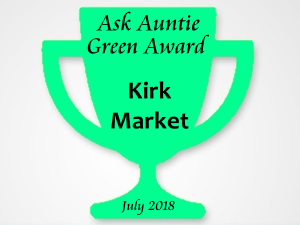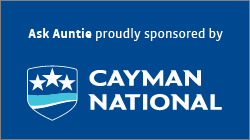Kirk Market goes green for the reefs
 (Auntie): After an article published this week on CNS about Hawaii banning sunscreen toxic to coral reefs, CNS put out a call to let us know about any retail outlets that stock safe brands. I am glad to share that Kirk Market has a variety of these products for sale, and for that, I am giving them an Ask Auntie Green Award.
(Auntie): After an article published this week on CNS about Hawaii banning sunscreen toxic to coral reefs, CNS put out a call to let us know about any retail outlets that stock safe brands. I am glad to share that Kirk Market has a variety of these products for sale, and for that, I am giving them an Ask Auntie Green Award.
Camille Humphreys, marketing manager for Kirk, explained that in May this year, instead of simply putting the products on the shelves, they and the National Trust for the Cayman Islands created a separate Reef-Safe display. She said, “We chose to prominently feature these products to increase awareness of the health and environmental benefits of the reef-safe alternatives.”
The store has a selection of both sun-protection and after-sun care products that will not harm reefs. Among the brands in stock are Stream2Sea, Alba Botanica, Babo Botanicals and Kiss My Face, with prices ranging from $5.99-$29.99.
I look forward to giving out more of these awards, so any reader who would like to nominate a company for going green can send me their name along with why you are recommending them.
Store owners who want to find out more about what products are reef-safe can contact the Trust at education@nationaltrust.org.ky. And consumers can look for Kirk’s display of Reef-Safe sunscreen in the store or visit their website here. I also encourage you to watch and share the video below.
Category: Ask Auntie, Environmental Questions



Curious – Kirk Market is selling environmentally friendly sunscreen but Kirk Freeport is not? mmmm!
Kirk Market selling sunscreen to save the reef and the minister of tourism working hard to destroy it!! A conflict of family interest, I would say. :). LMAO.
This must be some kind of consolation for the people whilst wanting to destroy coral in the making of a cruise port.
Below is an opinion of the “light guru”, a neurosurgeon from New Orleans, Dr.Jack Kruse. It is scientifically based.
So don’t “kill” the messenge.
“Do you need to wear sunscreen? NOPE. Not if you spend enough time exposing your skin to the sun’s rays in the early AM and late afternoon before sundown.
Why?
Because UV rays are low during those time, but IR (Infrared) light is strong during those times of the day.
Why does that matter?
Read this paper [see the link below] in its entirety and be ready for your jaw to drop several times. IR light is beneficial to us in many ways. Aside from powering our mitochondria to produce more ATP, it also prepares our skin for the coming UV radiation around solar noon. IR light IS THE SUNSCREEN WE NEED to protect us from the deleterious effects of UV radiation.
In the late afternoon, IR light also acts to help repair damage to skin that has been overexposed to UV rays at solar noon.
In order to understand the significance of this, you have to think about how humans evolved. We ate the whole animal, not just the muscle meat. And we spent most of our days outdoors in the sun, hunting-gathering, or playing. As a result of our natural way of life, we were protected from UV rays, because we spent hours outside in the morning and in the evening, which prepared our skin for UV exposure and then helped it repair.
The takeaway? If you are going to the beach this summer, get there EARLY, stay LATE, and make sure your skin is exposed to lots of early mornings and late afternoon sunshine! During solar noon, get enough sun so that your skin gets flush but does not burn. Then wear clothing and hats to block the sun’s rays until late afternoon and then…get naked again! The more exposure you give your skin to early morning sunlight, the more resilient it will be to the UV rays midday. ;).
“Yet, it has been shown that at realistic irradiances/doses, IR-A radiation has beneficial effects on collagen metabolism and upcoming UVR damage. Similar to PBM parameters, daily IR-A sun exposure delivers a much lower irradiance and fluence (dose) than powerful artificial sources (760-1450 nm).
One could, therefore, assume that early morning “sun salutation” (Surya Namaskar) and late afternoon procrastination on the beach are actually natural PBM treatments to prevent and repair, respectively. Consequently, if your shadow is taller than you are (in the early morning and late afternoon) you’re taking advantage of the beneficial effects of IR-A while avoiding peak (Zenithal) harmful UVR [60, 61]. Ultimately, it is another way of being sun smart.” https://www.ncbi.nlm.nih.gov/pmc/articles/PMC4745411/
Being of Scottish heritage, ginger, and very pale, it’d take me 2 lifetimes to get enough “safe” exposure to protect my skin! Think I’ll just keep buying reef safe sunscreen 😉
Any company that really wanted to save the coral would not offer any product that would destroy them.
Ironic that the prominent family exercising control over this company is the same one that wants CIG to spend hundreds of millions redeveloping the port, dredge the harbour for berthing facilities and potentially wipe out the remaining coral reef ecosystem we have in the capital.
And they won a Green award. Go figure!
They might get the green award when the check out girls the first thing they say is ‘do you and a plastic carrier bag’. Bags should not be offered, last night I saw a woman take ten bags all were half filled and this does not include the one mango, one apple, couple of potatoes in all the other bags.
Start charging $1 per bag people will soon recycle the old ones then…
Education is needed but with the environmental MLA who doesn’t care it will never happen.
Thanks Kirks (& CNS). I’ll be going there to replace my tube this summer rather than picking up the first one I come across in whatever store is handy after I run out. Every little bit helps.
Are they going to be providing the industrial composter required to compost their “compostable” plastic food containers?